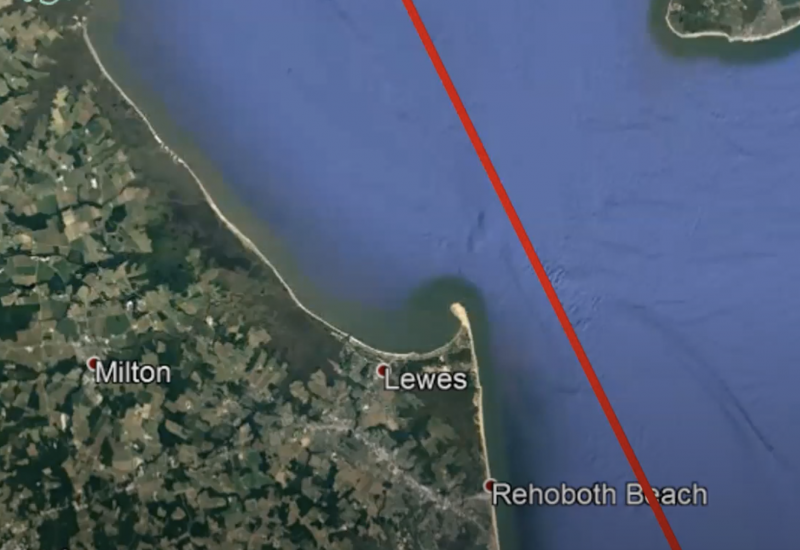Plans to export liquified natural gas through the Delaware Bay within a mile of Lewes have environmentalists concerned for public safety.
The Delaware Riverkeeper Network is opposing an application by New Fortress Energy and Delaware River Partners to build a new dock at a facility in Gibbstown, N.J. It is set to go before the Delaware River Basin Commission for a vote in early December.
Tracy Carluccio, deputy director of Delaware Riverkeeper Network, says an accidental release of liquified natural gas cannot be controlled and expands 600 times in volume if released into the atmosphere. Upon moving from a liquid to a vapor, it can explode without any ignition with a force equal to a thermobaric bomb, affecting areas as far as a quarter-mile away.
“That’s a huge amount of energy released immediately,” Carluccio said.
There is a coalition of groups opposing the application, including Delaware Surfrider Foundation, League of Women Voters of Delaware and Delaware Sierra Club.
“What concerns us and experts is the special properties of liquified natural gas,” Carluccio said. “It’s very different than any other hazardous material that’s being transported now by ship.”
The liquified natural gas material would be transported by truck and train from fracking sites in upstate Pennsylvania. It takes two weeks to fill a single ship, and work would occur 24 hours per day, Carluccio said.
The governors from Delaware, New Jersey, Pennsylvania and New York each appoint a representative to serve on the Delaware River Basin Commission. An official from the U.S. Army Corps of Engineers represents the federal government on the board.
Carluccio made a presentation about the proposed dock at Lewes Mayor and City Council’s Nov. 9 regular meeting. Lewes officials deferred action on a resolution to oppose the application until they learn more about the issue. It is expected mayor and city council will address it before the end of November.
While this facility is not proposed for Delaware, Carluccio said it’s worth noting that Delaware code prohibits the development of liquified natural gas terminals in the coastal zone.
Lewes resident Stuart Griffin has been a Delaware River & Bay pilot for nearly 25 years, and actively pilots ships up and down the navigation channel. While he shares safety concerns, he said, it’s not uncommon to have hazardous material moving through the bay and river.
“It’s very important to consider that hazardous cargos are what we do every day,” he said. “We specialize in evaluating and mitigating the risk associated with the movements of large volumes of extremely hazardous cargos. Very specifically, gas carriage by ship is something that happens every single day.”
Ethane, butane and propane are three other materials often transported, Griffin said, and each is less stable than liquified natural gas.
“We have no reason to believe we cannot protect both the safety and the lives of Delaware residents and visitors, as well as the environment of the state,” Griffin said.
Griffin said there are upwards of 5,000 ship movements a year in the bay and river, including about 800 movements of gas.
Capt. David Cuff, president of the pilots association, said the proposed dock is 73 miles from the sea buoy. A similar facility in the Chesapeake Bay is farther away from the ocean, and ships travel past more highly populated areas.
“We as pilots take [safety] very seriously,” he said. “We pride ourselves on the fact that we haven’t had any accidents. We work with the Coast Guard and local authorities to ensure everything goes smoothly.”
New Fortress Energy, the applicant, did not respond to a request for comment.
Nick Roth is the news editor. He has been with the Cape Gazette since 2012, previously covering town beats in Milton and Lewes. In addition to serving on the editorial board and handling page layout, Nick is responsible for the weekly Delaware History in Photographs feature and enjoys writing stories about the Cape Region’s history. Prior to the Cape Gazette, Nick worked for the Delmarva Media Group, including the Delaware Wave, Delaware Coast Press and Salisbury Daily Times. He also contributed to The News Journal. Originally from Boyertown, Pa., Nick attended Shippensburg University in central Pennsylvania, graduating in 2007 with a bachelor’s degree in journalism. He’s won several MDDC awards during his career for both writing and photography. In his free time, he enjoys golfing, going to the beach with his family and cheering for Philadelphia sports teams.






















































